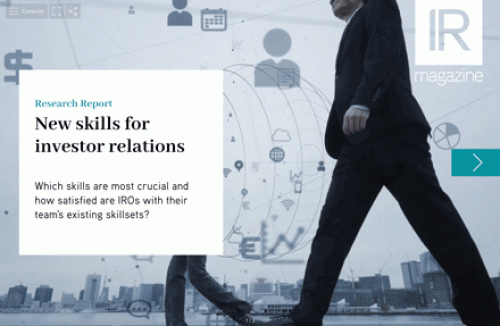
In a world of interconnectivity and tightening budgets, IROs are increasingly extending their influence into corporate communications, ESG, corporate strategy and finance, according to Citigate Dewe Rogerson’s 15th Annual Investor Relations Survey.
More than 150 IROs from leading companies across the world participated to provide a comprehensive picture of how companies around the world are evolving their IR strategies during a challenging macroeconomic landscape marked by liquidity constraints, reduced valuations and the imperative to enhance investor engagement.
The results from the survey reveal that the remit of the IRO is broadening: only 28 percent of respondents say they now exclusively handle core IR functions. IROs are targeting alternative sources of capital as market challenges increase: almost half the respondents say they have sought increased engagement with international investors, while 26 percent have intensified interactions with retail investors. Others report engaging more with smaller investors, family offices and hedge funds.
Increasing integration of AI-led processes, but slow adoption in investment decisions
With these increased responsibilities, a third of IROs now integrate AI-led processes into their IR activities, up from 22 percent in just six months since Citigate Dewe Rogerson’s AI-focused pulse survey in 2023. Now respondents say they are using AI tools for functions as diverse as drafting external communications, market intelligence and sentiment analysis.
In terms of future potential, opportunities are being seen in greater process efficiencies, call-transcript generation and more granular data analysis. We are observing a rapid adoption of AI in Asia-Pacific, as more than one in five organizations in the region are actively adjusting their engagement approaches to align with the evolving landscape driven by AI in the investment community. Yet, despite the increasing adoption of AI, an overwhelming 89 percent of investor relations professionals globally have yet to accommodate the rapidly growing use of AI in investment decision-making and alter their investor engagement strategies accordingly.
AI presents new challenges as well as opportunities in an already complex, fast-changing environment for IR teams. The emergence of AI heralds a new era, although we wholeheartedly endorse the view of respondents that there remains an indispensable need for a human element in IR, such as personal connections, access to management and the need for empathy in effective communications.
ESG remains priority as investors emphasize non-financial metrics
ESG remains a priority for IROs, but with interesting variances across regions. More than 90 percent of all respondents indicate that they have either seen increased investor focus on non-financial metrics or no change in priorities in the current climate, indicating that for the vast majority the focus on non-financial metrics alongside more traditional financial metrics is here to stay. In contrast, in Asia-Pacific only a minority (22 percent) of organizations are witnessing a shift in investor priorities toward non-financial metrics.
Only 15 percent of respondents report having no ESG representation at either board or senior leadership level, demonstrating increased focus on governance. Asia-Pacific stands out in this regard, with a significant proportion (89 percent) of companies having a sustainability committee at the board level, surpassing the global average of 64 percent. But a disconnect persists when it comes to remuneration: globally, 49 percent have no link between executive remuneration and ESG metrics and this is even more exaggerated in Asia-Pacific (89 percent).
Companies remain committed to their ESG targets: globally, a majority of respondents (61 percent) indicate that they are still on track to achieve their ESG/net-zero targets, with a further quarter (24 percent) partially on track. The number of companies in Asia-Pacific that are on track with their ESG targets is lower, however, at only 33 percent, while 56 percent are partially on track, and 11 percent are not on track. Many respondents call for standardized reporting frameworks and questionnaires to reduce the time spent responding to ESG data requests, a task that is increasingly falling within an IRO’s remit.
Looking ahead
The IR landscape will continue to present challenges, necessitating the evolution and adaptation of IR functions. The increasing integration of AI into IR practices is expected to become more commonplace, for both IR teams and investors in their evaluation and valuation of businesses.
Citigate Dewe Rogerson's commitment to assisting our clients in successfully navigating and capitalizing on these rapid changes in the IR landscape remains a key strength. With our deep expertise in investor relations, extensive global network and comprehensive understanding of emerging trends such as AI integration and ESG considerations, we are well positioned to provide strategic guidance, effective communication and tailored solutions that enable our clients to enhance investor engagement, achieve their ESG goals and drive long-term value creation in an evolving market environment.
For those interested in reading the full report, it can be accessed here.
Linda Pui is head of IR and corporate communications for Greater China and co-head of Hong Kong at Citigate Dewe Rogerson










